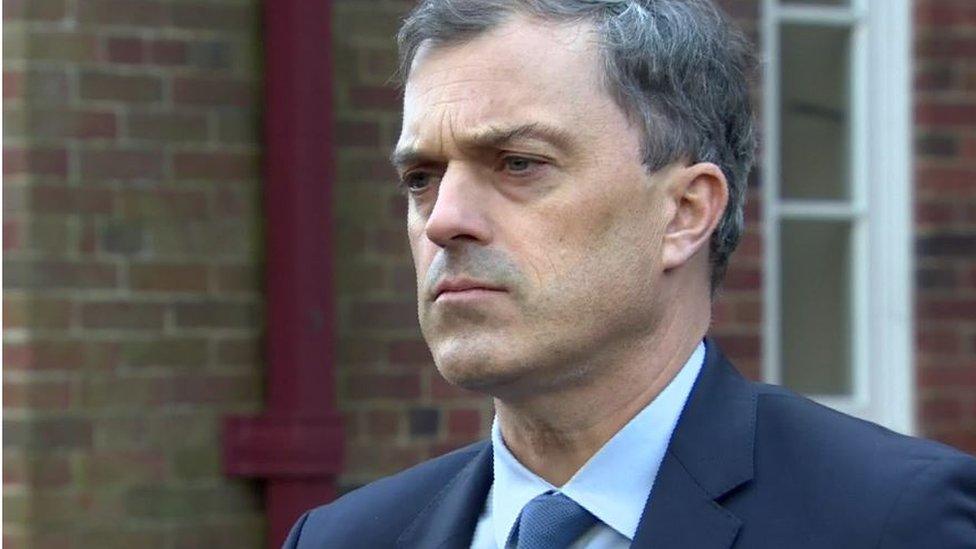Stormont talks: NI secretary says not all parties on board for agreement
- Published
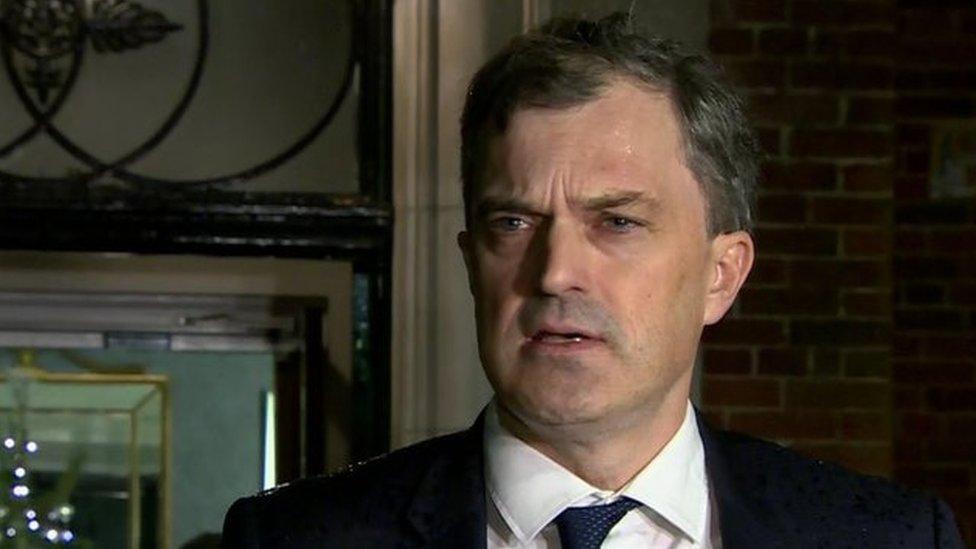
The NI secretary said he was "deeply disappointed" and urged the DUP to reflect on its decision
The British and Irish governments say progress has been made in talks to restore Stormont, but the Democratic Unionist Party is holding up a deal.
The secretary of state said he was "deeply disappointed" the Stormont parties were not yet in agreement.
Julian Smith was speaking after a meeting involving the five party leaders and the tánaiste Simon Coveney.
The DUP's Edwin Poots said his party would only sign up to a "fair and balanced" deal.
Northern Ireland has been without devolved government since January 2017.
The NI Assembly collapsed when the two biggest parties - the Democratic Unionist Party (DUP) and Sinn Féin - split in a bitter row over the DUP's handling of a green energy scandal.
Limited issues
"We are very close to being able to table a text of agreement and compromise," said Mr Smith.
"I wanted to do it tonight or tomorrow. I believe if we could table a text we could be back in the assembly on Monday.
"There are a number of outstanding issues but they are extremely limited.
"But unfortunately we do not have all parties on board, so the judgement I have made is that we should not table text.
"We will allow all parties to reflect on the impact of that decision on people in Northern Ireland who are deeply affected by the lack of decision making at Stormont."
Allow X content?
This article contains content provided by X. We ask for your permission before anything is loaded, as they may be using cookies and other technologies. You may want to read X’s cookie policy, external and privacy policy, external before accepting. To view this content choose ‘accept and continue’.
The tánaiste (Irish deputy prime minister) Simon Coveney said if there was a change of approach from the DUP on Thursday evening, a deal could still be reached before Christmas.
But he warned the governments would not bring parties back on Friday to "waste their time".
"We are at a place where the two governments within hours could produce a text - a fair compromise," he said.

What's the DUP's stumbling block?

What an unusual move by the two governments - calling out the DUP for stopping a Christmas breakthrough.
While talks have been ramping up at pace this week, one Stormont source said the DUP was "dragging its feet" over reform of the petition of concern.
It's not clear what exactly the stumbling block regarding the use of the controversial veto mechanism is, but Thursday's roundtable seemed to be an attempt to push the DUP over the line.
But already the DUP has reacted badly to the governments' tactic, saying it won't be bounced into anything and insisting there cannot be deadlines on such a sensitive process.
Given the current deadline is next month, things might pause over Christmas and allow the parties more time to assess their positions.
Come January though, there are only two choices left - take the deal on offer or face a fresh election.
Some in the DUP will find neither of those options appealing.

The DUP's Mr Poots said there had been "some effort by others to box us into a corner and force us into a position where we do not get a fair and balanced deal".
He said he would not allow "cherry picking" of the 1998 Belfast Agreement in relation to the Assembly's petition of concern.
If a petition of concern is presented to the assembly speaker, any motion or amendment will need cross-community support.
Effectively this means that, provided enough MLAs from a particular community agree, that community can exercise a veto over the assembly's decisions.
He added there remained sensitive issues around the Irish language and accused the government of not producing the figures in terms of what money it was prepared to stump up.
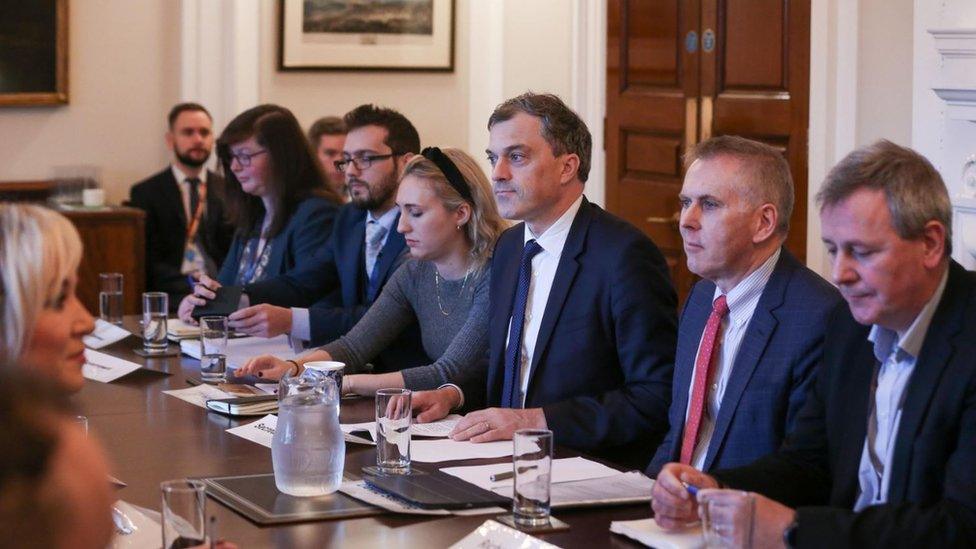
On Thursday Mr Smith met the parties to discuss NI's health crisis, as part of the overall process to restore devolution
The governments say devolution must be restored by 13 January 2020, or the secretary of state will call a fresh assembly election.
Mr Smith said he hoped the parties would find time on Thursday night to reflect, and made a plea to the DUP.
"I know there are people in the DUP who want to move forward and I would urge them to move forward so we can get this done," he said.
'Onus on DUP'
Sinn Féin's Conor Murphy said his party was deeply disappointed a deal has not been done.
"We have applied ourselves in the talks process over the last couple of days with both governments and the other parties," he said.
"Sinn Féin has been committed to doing a deal and that deal can be done in the coming days.
"It is our understanding that both governments and at least three other political parties are in this space.
"The onus is now on the DUP, once again, to tell the public why they are now holding up the restoration of the assembly."
'Have courage and lead'
Alliance Party leader Naomi Long described it as a "disappointing end" to the week, and said the parties needed to come back after Christmas and get a deal over the line.
"I believe a deal could be done now, real progress has been made - unfortunately not all of the parties agree that is the case," she said.
"People now need to have the courage and lead, rather than simply wait for others."
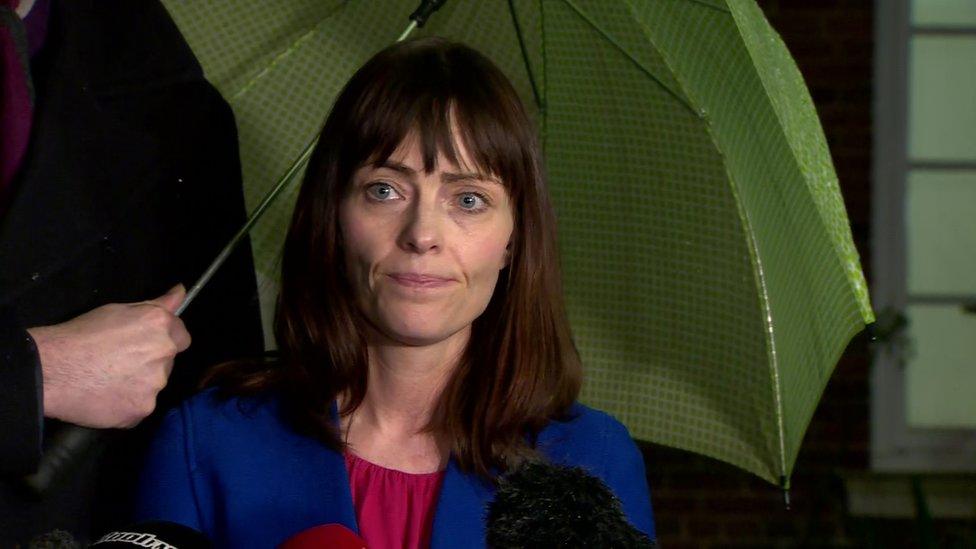
Nichola Mallon said a deal was possible before Christmas
SDLP deputy leader Nichola Mallon said her party would continue its commitment with the talks, but said it was difficult to point to a particular stumbling block.
"It's unfortunate the DUP don't feel they are in that space (to get a deal)... but we would encourage them, we will still be here and it is possible to do a deal before Christmas," she said.
Ulster Unionist leader Steve Aiken said his party would be ready with their "phones on" over Christmas to restore devolution.
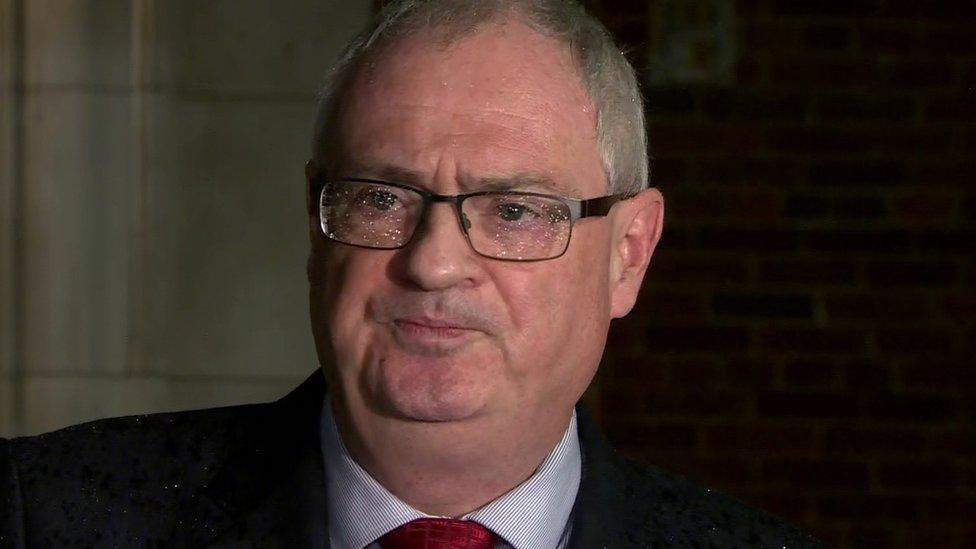
Ulster Unionist leader Steve Aiken said his party would be ready with their "phones on" over Christmas
"It would be interesting if we knew what the DUP's legitimate concerns were," he said.
"All five parties need to be involved."
- Published10 January 2020
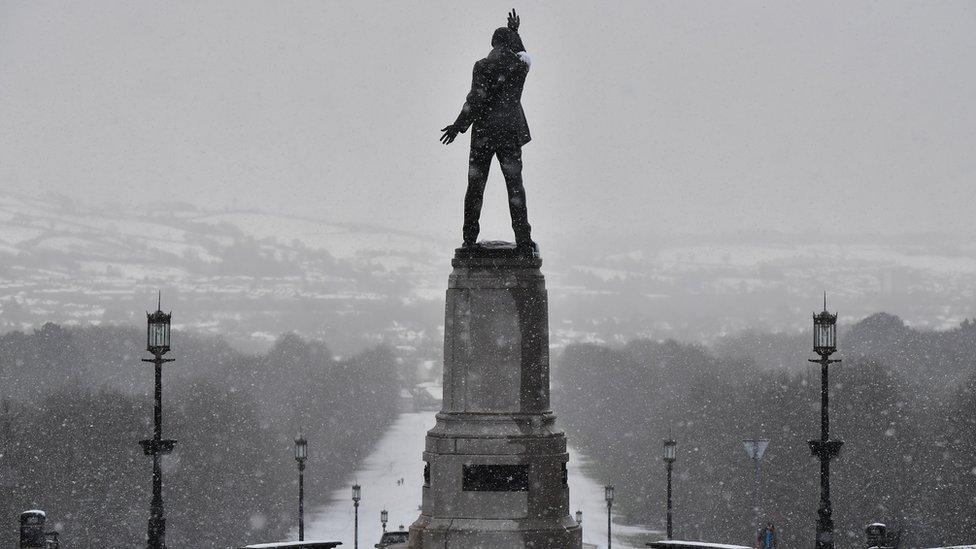
- Published16 December 2019
